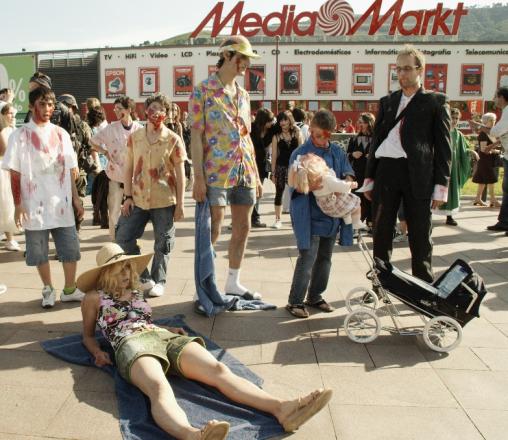The tactics of the adversary
Tiempo Muerto, a three-screen installation about the Barakaldo Zombiewalk is being included in the exhibition: The tactics of the adversary
October 28 to January 30 in NORMAL Espazo cultural intervention , Universidade da Coruña
The exhibition has been extended to 15 Februari 2014.
Curator and production: MANUEL SEGADE
Participating artists: Mohamed Bourouissa, Cyprien Gaillard, Núria Güell, Iratxe Jaio and Klaas van Gorkum, Jennie Livingston, Carme Nogueira, Fernando Sánchez Castillo, Mladen Stilinovic
All forms of consensus are necessarily based upon acts of exclusion. This is why the construction of a collective will requires defining an adversary. Such an adversary cannot be defined in broad general terms like ‘Empire’ or for that matter ‘Capitalism’ but in terms of nodal points of power that need to be targeted and transformed in order to create the conditions for a new hegemony. To create, through the construction of a chain of equivalence, a collective will, to engage with a wide range of institutions, with the aim of transforming them. (Chantal Mouffe)
NORMAL opens up to conflict with a new collective artistic project in which video art, installations, and actions establish a polemical dialogue between power and artistic activism, present more than ever on the streets and in public and private spaces. Occupied and communitarian spaces, as symptoms of the desire for debate and transgression.
A project which presents itself as a field of intervention and mediation between the rising citizenship, an art that sustains and urges a radical democracy towards transformation, and the subversion of hegemonic paradigms.
The tactic of the adversary is revealed in these video art works, which display active spaces, conflictual and opposed to acceptance of the norm. The proposals of these artists mark out a range of strategies that seek to activate the political tension that the viewer, as citizen, constructs through debate, negotiation or confrontation.
NORMAL, in these moments of crisis and big questions, transforms itself more than ever into a common space, experimental, open to citizenship, and generative of critical cultural policies.









